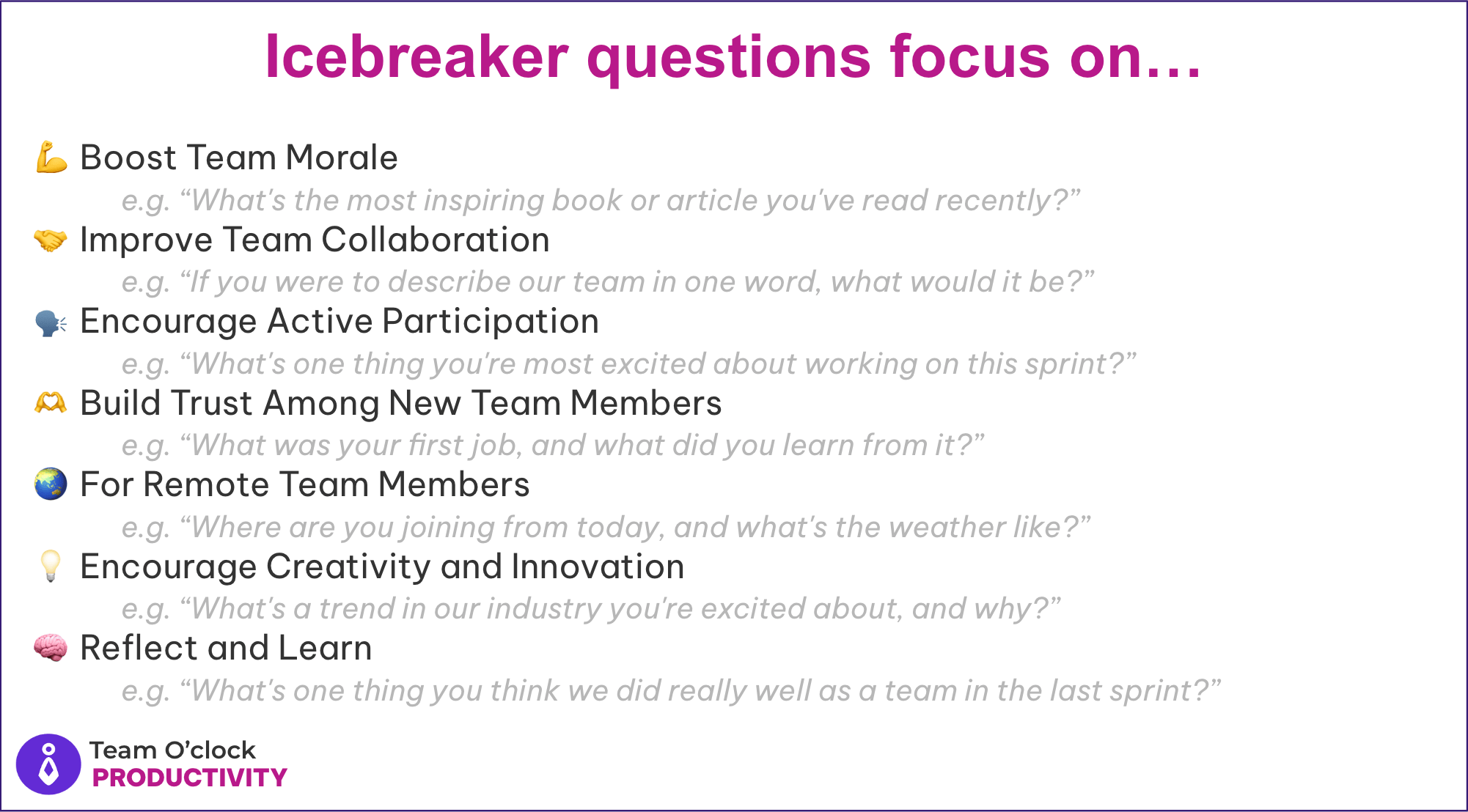
20 Icebreakers You Need For Your Next Agile Meeting

Building interpersonal connections among team members in remote settings is a common challenge in our industry. Limited face-to-face interaction often hinders open communication and collaboration. Therefore, one of the biggest responsibilities of Agile coaches is to find ways to build cohesive Agile teams. One simple yet powerful tool that has proven effective is using icebreakers in team meetings.
These questions are more than just a casual conversation starter. They are a strategic tool to enhance team dynamics, boost morale, and improve productivity. In this blog, you'll discover the origin and evolution of icebreaker questions, their relevance to Agile methodologies, and why they have become indispensable in Agile teams.
Additionally, you will get a list of 20 tried-and-tested icebreaker questions tailored for different scenarios in Agile teams and expert tips on how to implement them effectively in meetings.
Why Are Icebreakers So Effective and Popular Among Agile Teams?
Icebreaker questions are powerful tools for enhancing team morale and fostering collaboration in Agile teams. They set a positive tone for Agile meetings, creating a relaxed and engaging atmosphere that boosts team members' focus and motivation.
By encouraging open communication, icebreakers help establish a safe space where team members feel comfortable expressing their ideas. This is crucial for generating innovative solutions and fostering a collaborative problem-solving approach.
3 Key Benefits of Icebreaker Questions
Boosting Engagement: Icebreakers set a relaxed tone, making meetings more engaging and helping team members feel more connected.
Encouraging Participation: They ensure everyone participates, bringing diverse perspectives into discussions and improving decision-making.
Building Trust and Strengthening Relationships: They help remote team members discover shared interests, strengthen interpersonal connections, and improve team dynamics.
20 Effective Icebreaker Questions for Agile Teams
1. Questions to Boost Team Morale
What's one positive thing that happened to you this week?
If you could have any superpower to help with your work, what would it be and why?"
What's the most inspiring book or article you've read recently?
2. Questions to Improve Team Collaboration
What's one skill you have that you think could help the team but we haven't tapped into yet?
If you were to describe our team in one word, what would it be?
What's one small change that could improve our collaboration?
3. Questions to Encourage Active Participation
What's something new you've learned recently that could be useful for our projects?
If you could swap jobs with someone on the team for a day, who would it be and why?
What's one thing you're most excited about working on this sprint?
4. Questions to Build Trust Among New Team Members
What's a fun fact about you that not many people know?
What was your first job, and what did you learn from it?
What's one challenge you've overcome recently that you're proud of?
5. Questions for Remote Team Members
Where are you joining from today, and what's the weather like?
What's your go-to work-from-home productivity tip?
If you could have a remote team retreat anywhere in the world, where would it be?
6. Questions to Encourage Creativity and Innovation
If you could invent something to improve your job, what would it be?
What's a trend in our industry you're excited about, and why?
If budget wasn't an issue, what's one thing you'd love to implement in our next project?
7. Questions to Reflect and Learn
What's one thing you think we did really well as a team in the last sprint?
If you could go back and give your past self one piece of advice about work, what would it be?

How to Implement Icebreaker Questions Effectively in Agile Meetings
Set the Tone
Begin your meetings with a light-hearted icebreaker question to create a relaxed and welcoming atmosphere. This helps to set the tone for the meeting and ensures that team members have a positive mindset and are ready to engage and contribute.
Timing Matters
While icebreakers are important, keeping the session short, ideally between 5 and 10 minutes, is ideal. This ensures that the meeting stays focused on the agenda while still reaping the benefits of enhanced team dynamics.
Include them all
To ensure everyone's voice is heard, rotate the responsibility of asking the icebreaker question among team members. This practice promotes inclusivity and ensures that different perspectives are brought to the table.
Customization is key!
Tailor the icebreaker questions to fit the context of the meeting or the current sprint goals. Customization makes the questions more relevant and meaningful, enhancing their impact on the team's dynamics.
Takeaway
Icebreaker questions may seem like a small and simple tool, but their impact on the success of Agile teams is significant. By fostering open communication, trust, and collaboration, these questions help to create a positive team environment where everyone feels valued and engaged.
What are your favorite icebreaker questions? Share them in the comments below, or suggest new ones that have worked well for your team. If you're looking to enhance your Agile practices, sign up for Team O'Clock's Agile solutions and take advantage of our 15-day free trial to see how we can help you maximize your productivity.








